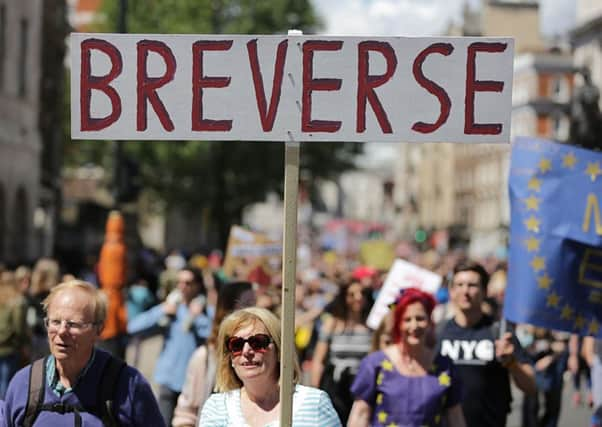Christine O'Neill: A word of advice on the way to Brexit


When a colleague suggested, just hours after the referendum result was known, that we should offer seminars to clients the following week on the implications of Brexit, I was sceptical. I assumed there would be little appetite for a briefing, particularly as so much about the final shape of a Brexit deal remains unclear. I couldn’t have been more wrong.
The demand for objective and pragmatic advice – about the Brexit process itself and the potential impact of an exit – is enormous. Seminars in Edinburgh, Glasgow and Aberdeen were all heavily oversubscribed with an audience of more than 200 at our event in Edinburgh meaning it was standing room only. These events all revealed the key Brexit issues exercising the leaders of Scottish businesses, public bodies and charities.
Advertisement
Hide AdAdvertisement
Hide AdWe know from client activity across most sectors that the real economy is currently fairly healthy, with businesses planning investment and growing their headcount and with the banking sector keen to support such activity. It was no surprise that many questions were focused on understanding how positive economic activity can continue.
The first issue is the exit process and the uncertainty about when and how negotiations will take place. Clients have already emerged from the initial shock of the result. They are now asking for concrete answers on the timing of exit negotiations and how much can be expected from any withdrawal agreement between the UK and EU under the – now famous – article 50 of the Treaty on the European Union. They have heard the views of EU Commissioner for Trade, Cecilia Malmstrom, that any negotiations on a future trading relationship with Europe would begin only after the UK’s exit from the EU.
Whether such a delay is necessary depends in part on the terms of Article 50(2) which provides for any withdrawal agreement to take account of “the framework” for the leaving country’s future relationship with the EU. Will that framework include details on new trade arrangements or are those details to be left over for future treaties? Given that Article 50 has not been invoked before, there is room for argument about its scope. No doubt the answer will depend on whether there is political will to achieve agreement on trade before the “longstop” deadline which, failing some other agreement on timing, occurs two years after notification is given of the UK’s intention to withdraw.
At a much more practical level, the referendum result has created uncertainty and in many cases distress for EU nationals already living and working in Scotland. For corporates headquartered outside Europe, particularly in the US, there has been confusion about the effect of the result.
In addition to reassuring those clients that there is no immediate change in status, we responded to the demand for advice by producing guidance on the rules governing British citizenship and on other options for protecting employees’ right to work. For certain sectors, including agriculture and hospitality, we have been considering the impact of restrictions on movement of unskilled workers and whether the Tier 3 visa system will be brought into use.
The financial services sector was well-represented at our seminars, especially in Edinburgh. Questions from those clients concerned the potential loss of free movement of services and associated “passporting” rights currently enjoyed by British banks and building societies. All attendees wanted to understand the pros and cons of options that already exist for states that are not members of the EU – whether, like Turkey, as part of the European Customs Union, as a member of the European Economic Area (the “Norway option”), or under some other arrangement.
We also discussed the impact of Brexit on existing law and regulation and on new EU laws that are mid-implementation. A question for almost all clients is how to approach the General Data Protection Regulation due to come into force in May 2018. Our advice is to continue to prepare on the basis that compliance with it will be necessary. If the UK becomes a member of the EEA it will undoubtedly have to comply with these regulations. Even if there is a more fundamental break, it is likely many businesses will want to be able to transfer personal data to and from the EU – requiring the UK to have data protection rules that meet the EU’s requirements.
In the week after the referendum, it proved crucial for us to begin the discussion with clients about the impact of Brexit. That discussion clearly has some way to go.
• Christine O’Neill is Chairman of Brodies and an expert in constitutional law